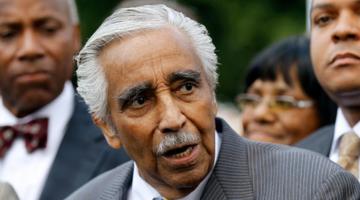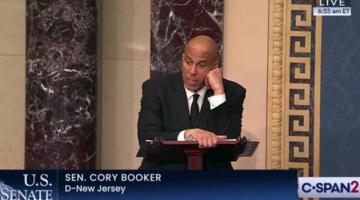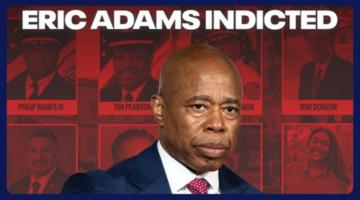“The Black Godfather": Clarence Avant and the Ruling Class Use of Black Pop Culture
Clarence Avant mastered pimping out Black identity to normalize the functioning of a nation premised on the oppression of his fellow Black citizens.
“The Black Misleadership Class clearly has a division in the entertainment industry.”
A Netflix documentary has recently premiered about a man unknown to many, who wielded inordinate influence in the music, entertainment, and film industry relative to his humble beginnings as a Black child from Climax, North Carolina. “The Black Godfather,” as Clarence Avant is sometimes called, shows how Avant was a crucial ruling class asset in neutralizing the radical politics of the late 1960s.
According to the documentary, during a time when over 70 percent of Black entertainers were directly controlled by organized crime figures, Clarence Avant was recognized for his ability to play hardball with Black talent. Avant was able to keep Black performers in line for the benefit of the White “Goodfellas” who had a stronghold on the entertainment industry. Early in his career Avant was recruited by the famed manager of Louis Armstrong, the mob connected Joe Glaser. Glaser recognized Clarence Avant’s potential skill as a kind of “Black Overseer” keeping the Black entertainers in check while extracting the highest value for their syndicate paymasters.
“Avant was able to keep Black performers in line for the benefit of the White ‘Goodfellas.’”
Clarence Avant, having only a ninth grade education, unimpressive stature, and no remote level of verbal dexterity or eloquence, parlayed his early role as the “Black Overseer” of entertainers and musicians into becoming “The Black Godfather.” Avant wielded so much power in the media and entertainment industry that even White corporate executives known for showing Blacks little regard or respect surrendered to Avant’s demands, even sometimes to their own economic disadvantage.
Clarence Avant’s power and influence grew to penetrate every echelon of American entertainment media. He interfaced with almost every influential Black entertainer from 1950’s Jazz singers to late 20thcentury Hip Hop superstars. Ironically, the documentary reveals that some of his long list of admirers, from giants like Quincy Jones to politicians like Bill Clinton and Barack Obama, had no idea what Clarence Avant actually did. What is obvious from the documentary is that the power of Clarence Avant did not lie in his mere persona, but stemmed from the forces that he worked on behalf of behind the scenes that held so much weight in the American culture industry.
“Even White corporate executives known for showing Blacks little regard or respect surrendered to Avant’s demands.”
What makesClarence Avant such an important person is that he was the key figure assisting in depicting Black popular culture as the embodiment of the American dream. This was done to the benefit of the American ruling class over a 50 year period when black life in America was becoming more politically and economically precarious. Though the Black Middle class has grown since Jim Crow, Black home ownership and unemployment are now at the level they were in 1968. Under the presidential management of Barack Obama, who states in the documentary that, “Clarence Avant is one of my favorite people,” 50 percent of Black wealth evaporated in the subprime mortgage crisis with no remedy from the first Black president.
Clarence Avant prides himself on having a role in the political elevation of every Democratic Party president this country has seen in the post Civil Rights era. He states in the documentary, “I believe in politics.” Early in the documentary he says, “The only thing that matters to me is numbers.” Meaning money is his primary motivation.
It is amazing to watch Bill Clinton wax on about the power and importance of Clarence Avant. Avant was an early contributor to Bill Clinton’s political campaign in 1992, and raised over one million dollars for Clinton’s efforts. Clinton went on to implement one of the most draconian crime bills in American history while overseeing the incarceration of more Blacks than all three prior presidents combined. Clarence Avant’s political activism illustrates a very important fact to students of Black politics: The Black Misleadership Class clearly has a division in the entertainment industry.
“The only thing that matters to me is numbers.”
Not only does this documentary act as a hagiography of Clarence Avant, but it also functions as a kind of visual celebration of Black fealty to the Democratic party in the post Civil Rights era. Corporate Trojan Horse Black politicians like Harold Ford, Jr. and even Senator Kamala Harris sing Avant’s praises throughout the documentary.
Many are unfamiliar with how Black America transitioned from those contentious political times in the late 1960s when Black movement figures from Dr. Martin Luther King to the Black Panther Party were decrying the crimes of American capitalism and imperialism at home and abroad. Some would believe that “law and order” simply descended upon the land under President Richard Nixon. What most forget is that from1967 to 1971, 300 urban rebellions reduced sections of American cities to smoldering embers.The U.S. ruling class feared the nation was besieged by a Black revolution of such magnitude that Lyndon Johnson believed the Soviet Union was helping coordinate it.
“The U.S. ruling class feared the nation was besieged by a Black revolution.”
This fear was so palpable that Lyndon Johnson authorized a commission to study the causes of the urban rebellions. One of the things most fascinating about the 1968 Kerner Commission Report is the section on using Blacks in media and popular culture to neutralize the radical fervor that was causing Blacks to not only challenge the American status quo, but exhibit willingness to burn the whole system to the ground.
From the 1968 "Kerner Commission Report: The National Advisory Commission on Civil Disorders" requested by Lyndon B. Johnson to diagnose the causes of the Urban Rebellions of that period and neutralize further occurrence of such rebellions:”
The Negro in Media
Finally the news media must publish newspapers and produce programs that recognize the existence and activities of the Negro both as a Negro and as a part of the community. It would be a contribution of inestimable importance to race relations in the United States simply to treat ordinary news about Negroes as news of other groups is now treated.
Specifically, newspapers should integrate Negroes and Negro activities in all parts of the paper, from the news, society, and club pages to the comic strips. Television should develop programming which integrates Negroes into all aspects of televised presentations. Television Is such a visible medium that some constructive steps are easy and obvious. While some of these steps are being taken, they are still largely neglected. For example, Negro reporters and performers should appear more frequently--and at prime time in news broadcasts, on weather shows, in documentaries, and in advertisements. Some effort has already been made to use Negroes in television commercials. Any initial surprise at seeing a Negro selling a sponsor's product will eventually fade into routine acceptance, an attitude that White society must ultimately develop toward all Negroes.
In addition to news-related programming, we think that Negroes should appear more frequently in dramatic and comedy series. Moreover, networks and local stations should present plays and other programs whose subjects arerooted in the ghetto and its problems.
In the context of the section above, one understands how after the 300 urban rebellions between 1967 and 1971 programs ranging from “Soul Train” to “Good Times” become important showcased spectacles of Black life and popular culture. Hence, the significance of a Clarence Avant, who mastered pimping out Black identity to normalize the functioning of a nation premised on the oppression of his fellow Black citizens.
Furthermore, the proliferation and hyper-capitalization of Black popular cultural production in the post Civil Rights era also must be thoroughly scrutinized in this context. With the expansion of Black images from streaming services to sports figures, the seduction of Black popular culture and its value as a vehicle of pacification and social control in periods of political contention becomes more obvious.
With the rise of White reactionary nationalism all over the globe and retreats on the gains of the Civil Rights Era from voter suppression to Black wealth evisceration, isn’t it time that people view figures like Clarence Avant and the overall Black media and entertainment establishment with not only suspicion, but as accessories to the crime of American racial hostility?
“The seduction of Black popular culture as a vehicle of pacification and social control becomes more obvious.”
Is it accidental that Citibank’s favorite presidentBarack Obama and his wife have now ventured into the culture industry to produce programming for Netflix? Are people foolish enough to believe this is all just “entertainment,” for fun and enjoyment with no political or social agenda? When considering where this obsession with popular culture has taken the most disadvantaged among Americans, it is clear that the Kerner Commission’s formula for political pacification was rather effective. The Clarence Avant’s of the world can continue to laugh their way to the bank.
Clarence Avant starts his career as tool of organized crime, yet is able to rise to such a level in the American capitalist system that he becomes an emissary of the Democratic Party, working to ensure its political success by leveraging Black entertainment. Avant becomes a kind of “fixer,” acting as an intermediary between Black entertainers and the capitalist culture industry, as well as the American political system. Concurrently, Avant secures the expansion of the Black capitalist class in the entertainment industry while the hard realities of Black life are masked behind the bright lights and sweet music.
Therefore, the most important lesson from the documentary, “The Black Godfather,” is that agents of Black subjugation don’t have to be as vulgar and crass as a Bull Conner or Donald Trump. Sometimes those agents can be heralded as models of Black success while fulfilling their roles as the comprador elite helping suck the life out of innocent poor and working class Black folk. In Clarence Avant’s case at least it was done to a backbeat you could dance too. Aren’t we happy such a man provides a role model to emulate?
Pascal Robert is an iconoclastic Haitian American Lawyer, blogger, and online activist for Haiti. You can find his work on the web at Thought Merchant , and at Huffington Post . He can be reached via twitter at https://twitter.com/probert06 @probert06 orthoughtmerchant@gmail.com .
COMMENTS?
Please join the conversation on Black Agenda Report's Facebook page at http://facebook.com/blackagendareport
Or, you can comment by emailing us at comments@blackagendareport.com



















